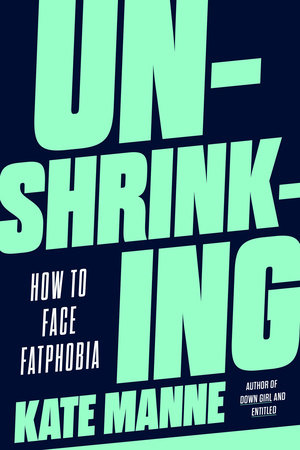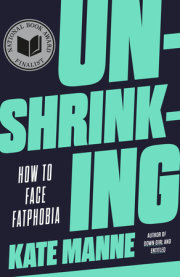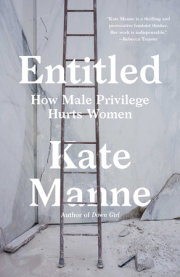Chapter 1
The Straitjacket of Fatphobia
When Jen Curran, thirty-eight, went to see a kidney doctor, she was prescribed weight loss. “Can you start dieting and exercising? Try to lose some weight,” she was counseled. Jen played along, despite serious misgivings. “Okay, yeah. I can do that.” Jen had a five-month-old baby at home. The doctor continued, “Take the baby out for walks, eat less salt, nothing from a box, eat plants.”
Jen noted that she didn’t need the instructions: she was already “painfully well-versed” in weight loss. She had lost some 115 pounds earlier in her life, not for the sake of her health, but for the sake of her appearance. She had since decided, some years earlier, to let go of her self-described obsession with her weight and to embrace her body as it was. She felt strong and resilient, despite the high levels of protein in her urine that her ob-gyn had flagged with concern during her pregnancy, along with high blood pressure. She had been put on bed rest during her second trimester and induced at thirty-seven weeks, before delivering her baby daughter, Rose.
But, contrary to her ob-gyn’s hopes, the protein in Jen’s urine had not resolved itself after the pregnancy was over. She was advised to see a kidney specialist at the earliest opportunity.
“And if I lose weight, the protein will go away?” Jen asked the doctor at her appointment. “Yes. Lose weight, the protein will go away. Come back four months from now.”
Jen’s weight was not the problem, though: she had bone marrow cancer. If she hadn’t been suspicious of this doctor’s advice and sought out a second opinion a month later, the cancer would have continued to ravage her body, and her protein levels would have remained as high as ever. “There’s nothing diet or exercise can do to touch this much protein,” the second kidney specialist told her.
Fortunately, Jen’s cancer—multiple myeloma—was caught in time to allow it to be treated with six months of chemotherapy and steroids. Jen’s prognosis is, at the time of this writing, a good one.
Other people are not so lucky. When Laura Fraser’s sister, Jan, fifty-nine, came to visit her, Laura told her she looked great. Jan had lost sixty pounds. She hadn’t been trying to: for months she had been in so much pain that she hadn’t had much of an appetite. She was experiencing postmenopausal vaginal bleeding and near-constant pelvic pain. Her eyes welled with tears as she described her attempt to get help from an ob-gyn. He had performed a routine examination and then effectively shrugged. Jan felt dismissed as a “fat, complaining older woman.” She tried to address her own pain by experimenting with dietary restrictions—cutting out dairy and gluten—and taking over-the-counter pain medications. A physician’s assistant she saw months later thought she was jonesing for an opiate fix. But at least he ordered blood work.
Jan received a call early the next morning, telling her to go straight to the ER. She was admitted to intensive care in critical condition, with extremely high levels of calcium in her blood. An MRI revealed a huge mass in her abdomen: the largest endometrial tumor her surgeon had ever seen. Her pelvis was filled with cancer; her bladder had also been invaded; there were even spots on her lungs.
Jan lived just six months longer. She continued to waste away throughout her rounds of chemotherapy. And people continued to compliment her on her weight loss.
The straitjacket of fatphobia is a source of pressure and discomfort for most, if not all, of us. But it makes life even harder when our bodies do not fit within certain rigid confines, which some bodies—including mine—will always strain against and spill over. And much like a straitjacket, fatphobia serves as a powerful social marker: it signals that some bodies should be ignored, disregarded, and mistreated. It marks fat bodies as undeserving of care—and of education, employment, and other basic forms of freedom and opportunity.
The straitjacket starts tightening early. It’s well known that fat children face widespread ridicule in school; a child’s weight appears to be the most common basis for schoolyard bullying. I remember being seated in a circle of kids, eating our lunches in a grassy playground, when a prepubescent boy pointed at each of us in turn: “skinny,” “medium,” or “fat,” he casually pronounced us. When I was the only girl classified as fat, the sound of social static buzzed in my ears. There was no doubt in my mind that I had been accorded the lowest ranking. And it affected not just how I perceived myself but how my peers did too. “Mangoes make you fat!” one said, turning up their nose in disgust at the contents of my lunch box. “And mangoes make your breath stink!” another added for good measure.
Such treatment, like any form of early weight stigmatization, places larger children at increased risk for depression, anxiety, low self-esteem, and body dissatisfaction. There is even increased risk, in extreme cases, of suicidal behaviors.
Fat children are also subject to discrimination and bias from their teachers—yes, their teachers. Educators frequently express negative weight-based stereotypes about their larger pupils, assuming they will perform worse in reasoning tasks, struggle more with physical education, and have poorer social skills. I flash back to a teacher clapping an avuncular hand on my shoulder and declaring me a “brick house” when I was fourteen years old. I immediately felt my stomach lurch, seeing myself through his eyes as stocky, stolid, stupid. And indeed, teachers tend to perceive children classified as normal weight as having above-average abilities and children classified as obese as having academic challenges. It’s true that there is some (mixed and inconsistent) evidence that students classified as overweight or obese do tend to perform worse in school. But this is plausibly because, as one study showed, these students tend to disengage from school, and even avoid going altogether, when they are subject to weight-based teasing. Another study showed that when such weight-based teasing was duly controlled for, the performance gap disappeared. Hence, inasmuch as educators hold larger children responsible for not performing as well as their peers, this is effectively victim blaming—and the result of noxious, wrongheaded stereotypes about fat people’s lack of acumen.
Moreover, even if students perform just the same, they are perceived differently as they gain weight. One large longitudinal study found that, from fifth to eighth grade, an increase in a student’s BMI led teachers to deem them less academically capable, despite unchanging objective measures in the form of their standardized test scores. Specifically, girls were perceived as less able readers and boys as less able mathematically—which, interestingly, tracks the areas in which each group is expected to do the best according to gender stereotypes.
Some studies suggest that these forms of fatphobic educational bias may be particularly pronounced for girls. Adult women classified as overweight or obese frequently report having experienced weight stigmatization from an educator, with a third recalling at least one such incident and 20 percent recalling more than one.
One of the most galling studies I came across while researching this book showed that parents in the 1990s were less willing to offer financial support to their fat daughters to attend college, compared with their thinner ones. I am grateful that my own parents never saw me, whatever my weight, as any less bright or industrious or worthy of a good education. Indeed, they celebrated my intelligence along with my appetite. But many girls and women are not so fortunate. Many of us never have the chance to develop our voices, owing to the sense that someone with a body like ours wouldn’t have anything valuable to contribute. It strikes me as a heavy, if seldom-noticed, silence.
Copyright © 2024 by Kate Manne. All rights reserved. No part of this excerpt may be reproduced or reprinted without permission in writing from the publisher.









